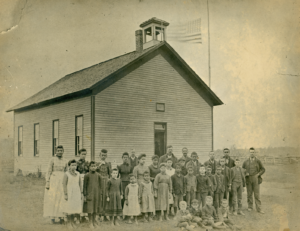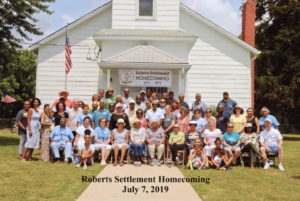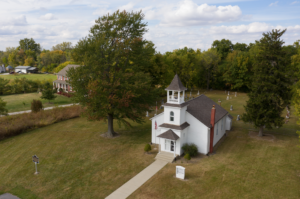Roberts Settlement
Learn About the Black Pioneer Experience
Writer / Christy Heitger-Ewing
Photography Provided
 Roberts Settlement was founded in 1835 by three African American men named Hansel Roberts, Elijah Roberts and Micajah Walden, who travelled from North Carolina to escape tumultuous times. They sought an area where they could continue their farming life and ultimately purchased homesteads in northern Hamilton County, where they permanently settled with their families. They cleared out the wilderness to build log cabins. By 1840 the neighborhood included 10 families and 900 acres of land. In 1858 they built a chapel, and in 1914 they added a belfry and vestibule.
Roberts Settlement was founded in 1835 by three African American men named Hansel Roberts, Elijah Roberts and Micajah Walden, who travelled from North Carolina to escape tumultuous times. They sought an area where they could continue their farming life and ultimately purchased homesteads in northern Hamilton County, where they permanently settled with their families. They cleared out the wilderness to build log cabins. By 1840 the neighborhood included 10 families and 900 acres of land. In 1858 they built a chapel, and in 1914 they added a belfry and vestibule.
By the second and third generations, these farms were being subdivided to heirs, often breaking down an 80-acre farm equally for 10 children, which wasnt enough land for families to sustain themselves as commercial farmers. As a result, family members pursued other opportunities that took them away from Roberts Settlement.
We have some very prominent descendants who have gone on to do great things in medicine, law, religion and teaching, says LaVella Hyter, who was raised at Roberts Settlement between 1948 and 1962 and now serves as president of the board of directors.
Every July, they hold an annual homecoming that attracts between 150 and 175 people. The three-day event includes hayrides through the countryside, smores, fireworks, a luncheon that celebrates marriages, births, graduations and promotions, and also a worship service in the chapel. This year was the 98th consecutive homecoming – last years was virtual, but leaders were sure not to cancel it, so as not to break the streak.
Throughout the past decade, Hyter, board member Bryan Glover, and others with Roberts Settlement have been increasingly proactive about collaborating with the community to spread the word about the history of Roberts Settlement. For instance, they have partnered with Conner Prairie and worked with Indiana playwright Celeste Williams, who wrote a play about the time Frederick Douglass came to Noblesville and how the Roberts family helped in getting him there. They schedule tours and have also shared their history at community events in Carmel, Fishers and Noblesville. They will also do off-site presentations for organizations, schools and even YouTube channels.

Today Roberts Settlement is a nonprofit organization. Every penny raised goes right back into maintaining the property. For instance, last year they put a new roof on the chapel. Their next goal is to create a legacy walk, which will be an interactive exhibit on the property that will allow visitors to scan a QR code and link to videos, photographs and documents.
We want to collect stories from some of the descendants as to what has been most significant to them about Roberts Settlement, Hyter says. We dont want to make it a museum, but we want to share our story with anybody and everybody who wants to know about perseverance, progress, and the black pioneer experience. We dont want it to be a secret. We want to let people know that this is what took place right in their backyard.
 Their goal is to have the majority of the legacy walk completed in time for the 100th homecoming.
Their goal is to have the majority of the legacy walk completed in time for the 100th homecoming.
Hamilton County Tourism and Indianapolis Monthly magazine have listed Roberts Settlement as a must-see place to visit.
We invite people to come engage with the story of the Indiana black pioneer, Glover says. We all know about William Conner and others who came and settled in Indiana, but people need to realize that there are others who came here whose stories have been left out of that discussion.
Donations to Roberts Settlement can be mailed to P.O. Box 561, Noblesville, IN 46061, made payable to Roberts Chapel Church & Burial Association, or submitted online by visiting robertssettlement.org and clicking on the Donations tab. Roberts Settlement is also on Facebook.




